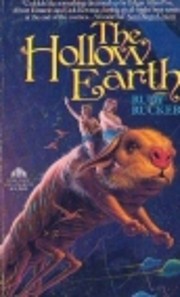

Click on a thumbnail to go to Google Books.
|
Loading... The Hollow Earth (1990)by Rudy Rucker
 None No current Talk conversations about this book.   ) )My reactions to reading this novel in 2005. I didn’t care for this novel very much. First off, I’ve never been keen on the lost race/primitive alien culture story which is what you get when the narrator and Edgar Allan Poe reach the Hollow Earth. Second, I was bored by all the details of that Hollow Earth. I didn’t even bother to follow all the details of the central Anomaly and Mirror Earths. Rucker’s afterword says it is a description of an Einstein-Rosen bridge which is also mentioned in Rucker’s non-fiction The Fourth Dimension. The only thing I really liked about the book was its description of the alternate Poe as a con-artist and counterfeiter and how bits of Poe and his language (particularly “Berenice” and The Narrative of Arthur Gordon Pym) are worked in to Rucker’s story. Having read Rucker's Postsingular about a month ago, I can say that this book really surprised me. It's difficult to see that the same author wrote both books. The Hollow Earth is so much more cohesive, and some of the science behind the ideas presented is actually explained in the accompanying "Editor's Note." The writing style is completely different. I really enjoyed The Hollow Earth, and not just because I love anything dealing with the theory of Symmes' Hole. The premise of the novel - Edgar Allan Poe and friends travel through the South Pole into the hollow earth, an idea explored in several of Poe's works, but with some twists - is fascinating. Some of the characterizations are almost purposefully poor, to the point where they're hilarious. Poe is one of the flattest characters; he seems to have been made as wacky and unbalanced as possible. The number of people who die gruesome deaths, soon thereafter treated rather nonchalantly, also adds an odd surrealism to a book that otherwise successfully mimics the style of classic sci-fi adventure stories. It's a strange book, but much in keeping with the ideas and novels from which it draws its inspiration. Mason Reynold narrates this rather odd tale involving a slave named Otha, a dog named Arf, and the arrogant and not-so-famous Edgar (Eddie) Allan Poe. Mason leaves his family farm, becomes accused of theivery and murder, and then meets Eddie Poe when he takes refuge in a town downriver. Eddie Poe is not the famous writer we know, but a struggling writer, alcoholic, and all around strange and detestable human being. But it is Eddie's interest in a theory that the Earth is actually hollow that drives the main thread of the story as Mason becomes wrapped up in the fascination and follows Eddie and others into the twisted and strange hollow earth. This is just about one of the weirdest stories that I have ever read, that touches upon rather uncomfortable subjects (like sex with corpses) and delves into various oddities. It is mostly this version of POe that offers the most discomfort and the everyday world before they enter the hollow earth. Once inside the story takes on a more surreal tone while managing to seem relatively plausible (for a book filled with shrimp-like pig things, flower people, and god-like sea cucumbers). I didn't know what to make of it while reading it, and I still don't know what to make of it. It certainly got more and more interesting as it went along, so I think I liked it. no reviews | add a review
Is contained in
In 1836, Mason Algiers Reynolds leaves his family's Virginia farm with his father's slave, a dog, and a mule. Branded a murderer, he finds sanctuary with his hero, Edgar Allan Poe, and together they embark on an expedition to the South Pole. It is there where strange people, and stranger creatures abound, that their bizarre adventures truly begin. No library descriptions found. |
Current DiscussionsNonePopular covers
 Google Books — Loading... Google Books — Loading...GenresMelvil Decimal System (DDC)813.54Literature American literature in English American fiction in English 1900-1999 1945-1999LC ClassificationRatingAverage: (3.32) (3.32)
Is this you?Become a LibraryThing Author. |
||||||||||||||||||||||||||||||||||||||||||||||||||||||||||||||||||||||||||||||||||||||||||||||||||||||||||||||||||||||||